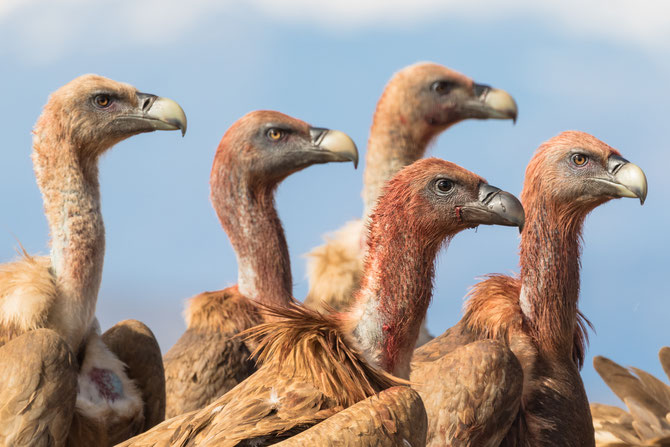
A recently published study illustrates that although vultures can carry microorganisms that can cause disease in humans, vultures don’t pose a threat to public health, but rather likely limit the spread of diseases.
Overview
Many suggest that obligate scavenger birds (vultures and condors) are resistant to microorganisms (bacteria, viruses and fungal infections). However, the effects that microorganisms can have on the avian scavenger guild have not been widely studied. Understanding how microorganisms affect vultures is especially relevant due to their scavenging behaviour as they consume carcasses in various stages of decomposition, which are breeding grounds for potentially pathogenic microorganisms. Another pertinent premise to examine was whether vultures spread diseases to humans and other animals, or whether they instead limit and mitigate the spread of diseases, as this can prove vital to support conservation efforts. Researchers recently addressed these issues by reviewing and analysing relevant studies.
Method
The research team selected and examined 76 published studies, focusing on the geographical location, the vulture species studied, and the bacterial, viral and mycotic (fungal) species isolated or detected in the different vulture species.
Results

The review indicated that bacteria, viruses and mycotic microorganisms are present in vultures. Some of them can be beneficial as they occur within the intestinal microbiome. However, certain microorganisms may negatively impact the health of vultures, producing a variable degree of health alterations that can lead to disease, with consequences for their fitness and might also cause death.
The research team further identified that vultures could carry zoonotic and human‐specific pathogens with antibiotic resistance that have the potential to cause severe disease in humans. Even so, there is no scientific evidence showing that vultures play an epidemiological role in spreading pathogens or antibiotic resistance to humans and other species.
This study further supports the presumption that vultures and condors may help prevent the spread of diseases. As they remove rotting carcasses that may potentially host pathogenic microorganisms from the environment, they eliminate this source of microorganisms and potentially help regulate diseases in the ecosystem. Furthermore, vultures could eliminate pathogens when they pass through their gastrointestinal tract because of the low stomach pH and the functions of the intestinal microbiome.
Conclusions and recommendations
In summary, this assessment of published research found no evidence that vultures and condors spread pathogenic microbes or promoted antibiotic resistance to humans and other animals, but that they might reduce the spread of infectious diseases by removing decomposing organic material. However, further research is required to fully evaluate the role of vultures in disease transmission, as scientific evidence is still limited. For example, the authors recommend further investigation into the role of supplementary feeding sites and rubbish dumps in disease transmission to and among vultures, and the need to adapt management strategies accordingly.
Finally, the research team suggests including microorganisms as a potential threat to vulture conservation because they can cause disease in individuals, and potentially worsen vultures’ health when combined with other threats, such as contaminants and deliberate poisoning.
Source
Plaza, P., Blanco, G. and Lambertucci, S., 2020. Implications of bacterial, viral and mycotic microorganisms in vultures for wildlife conservation, ecosystem services and public health. Ibis. https://doi.org/10.1111/ibi.12865



